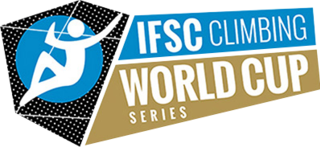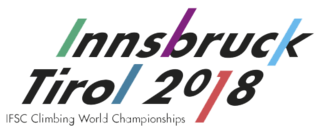
The IFSC Climbing World Cup is a series of competition climbing events held during the year at various locations around the world, organized by the International Federation of Sport Climbing (IFSC). At each event, the athletes compete in three disciplines: lead, bouldering, and speed. The number of events varies from year to year, and the winners for each discipline are decided by the points accumulated in the year.

Kim Ja-in, more widely known in the Western world as Jain Kim, is a professional climber who specializes in competition climbing. She is mainly active in competition lead climbing and competition bouldering. She has won the Lead Climbing World Cup three times, the Lead Climbing World Championship once (2014), and the Rock Master once. She has won the Asian Championships 14 times in 15 years, 11 times in lead climbing and 3 times in bouldering.

The 2018 IFSC Climbing World Championships, the 15th edition, were held in Innsbruck, Austria from 6 to 16 September 2018. The championships consisted of lead, speed, bouldering, paraclimbing, and combined events.
The 2017 IFSC Climbing World Cup was held in 15 locations. Bouldering competitions were held in 7 locations, lead in 8 locations, and speed in 7 locations. The season began on 7 April in Meiringen, Switzerland and concluded on 12 November in Kranj, Slovenia.
The 2018 IFSC Climbing World Cup was held in 14 locations. There were 22 events: 7 bouldering, 7 lead, and 8 speed events. The season began on 13 April in Meiringen, Switzerland, and concluded on 28 October in Xiamen, China.
The 2016 IFSC Climbing World Cup was held in 16 locations. Bouldering, lead and speed competitions were held in 7 locations. The season began on 15 April in Meiringen, Switzerland and concluded on 27 November in Kranj, Slovenia.
The 2015 IFSC Climbing World Cup was held in 13 locations. Bouldering competitions were held in 5 locations, lead in 7 locations, and speed in 5 locations. The season began on 17 May in Central Saanich, Canada and concluded on 15 November in Kranj, Slovenia.
The 2014 IFSC Climbing World Cup was held in 16 locations. Bouldering competitions were held in 8 locations, lead in 8 locations, and speed in 7 locations. The season began on 26 April in Chongqing, China and concluded on 16 November in Kranj, Slovenia.
The 2013 IFSC Climbing World Cup was held in 19 locations. Bouldering competitions were held in 8 locations, lead in 8 locations, and speed in 7 locations. The season began on 22 March in Chongqing, China and concluded on 17 November in Kranj, Slovenia.
The 2012 IFSC Climbing World Cup was held in 17 locations. Bouldering competitions were held in 6 locations, lead in 9 locations, and speed in 6 locations. The season began on 13 April in Chongqing, China and concluded on 18 November in Kranj, Slovenia.
The 2011 IFSC Climbing World Cup was held in 20 locations. Bouldering competitions were held in 9 locations, lead in 10 locations, and speed in 5 locations. The season began on 14 April in Milano, Italy and concluded on 27 November in Barcelona, Spain.
The 2009 IFSC Climbing World Cup was held in 14 locations. Bouldering competitions were held in 5 locations, lead in 6 locations, and speed in 4 locations. The season began on 11 April in Kazo, Japan and concluded on 15 November in Kranj, Slovenia.
The 2008 IFSC Climbing World Cup was held in 15 locations. Bouldering competitions were held in 7 locations, lead in 6 locations, and speed in 6 locations. The season began on 18 April in Hall, Austria and concluded on 16 November in Kranj, Slovenia.
The 2007 IFSC Climbing World Cup was held in 18 locations. Bouldering competitions were held in 7 locations, lead in 8 locations, and speed in 6 locations. The season began on 30 March in Erlangen, Germany and concluded on 18 November in Kranj, Slovenia.
The 2019 season of the IFSC Climbing World Cup was the 21st season of the competition. Bouldering competitions were held at six stops of the IFSC Climbing World Cup. The bouldering season began on April 5 at the World Cup in Meiringen, and concluded on June 8 with the World Cup in Vail. At each stop a qualifying was held on the first day of the competition, and the semi-final and final rounds were conducted on the second day of the competition. The winners were awarded trophies, and the best three finishers received medals. At the end of the season an overall ranking was determined based upon points, which athletes were awarded for finishing in the top 30 of each individual event.
The 2019 IFSC Climbing World Cup was held in 12 locations. Bouldering, lead and speed competitions were each held in 6 locations. The season began on 5 April in Meiringen, Switzerland with the first bouldering competition in the season, and concluded on 27 October in Inzai, Japan, with the last lead climbing competition in the season.
The 2020 IFSC Climbing World Cup was the 32nd edition of the World Cup held by the International Federation of Sport Climbing. It was scheduled to be held in 12 locations across three climbing disciplines, bouldering, lead and speed, due to the COVID-19 pandemic concerns, only one event was held, the Lead World Cup at Briançon in August, while all other World Cups were canceled.
The 2021 IFSC Climbing World Cup was the 33rd edition of the international sport climbing competition series, held in seven locations. There are 11 events: four bouldering, five lead, and two speed events. The season began on 16 April in Meiringen, Switzerland with the first bouldering competition in the season, and concluded on 4 September in Kranj, Slovenia. The International Federation of Sport Climbing had initially scheduled 18 events concluding on 31 October, but COVID-19 travel restrictions resulted in the cancellation of events in Xiamen and Wujiang in China, Jakarta in Indonesia and Seoul in South Korea.
Competition lead climbing at the 2019 IFSC Climbing World Cup was held over six stages at six different locations, from 4 July to 27 October 2019. The top three in each competition received medals, and at the end of the season, the overall winners were awarded trophies. The overall winners were determined based upon points, which athletes were awarded for finishing in the top 30 of each individual event. Adam Ondra won the men's seasonal title, Chaehyun Seo won the women's seasonal title, and Japan won the national team title.
Competition lead climbing at the 2021 IFSC Climbing World Cup was held at five locations, from 23 June to 4 September 2021. The International Federation of Sport Climbing had initially scheduled six competition-lead climbing events concluding on 17 October, but COVID-19 travel restrictions resulted in the cancellation of the event in Xiamen, China.


